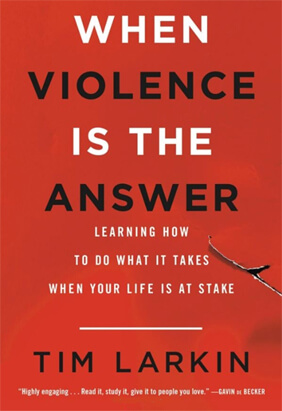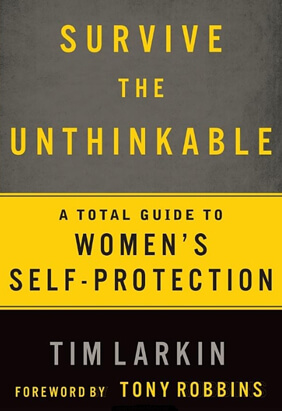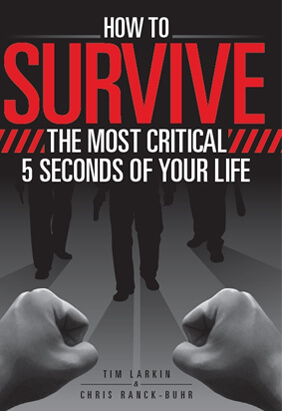- timlarkin
It’s a Nice Idea–But Does It Really Work?
Perhaps you’ve already had the dream: at a park in daylight, with children, or a dark close-in space like an alley, or, the one I remember most vividly, a seedy gas station… regardless of the setting, they come for you. Many or just one, it doesn’t matter; you take an eyeball, you break a leg, hell, you break a neck. You can feel it go, popping and cracking from tense to loose in your hands. You slam him down, bouncing his head–now facing the wrong way–off the pavement.
And he gets back up.
Or you dig the eyeball out and it makes no difference, he keeps on coming, keeps on doing what it is here’s there for–to kill you.
You wake up in a cold sweat, heart racing. The dreamstuff sticks with you the next day, a residue of unease. Even on the mats, it’s still there, nagging at you. That one question:
What if it just plain doesn’t work?
The second-most common criticism we get after ‘going slow’ has to do with the reactions. People can’t believe it’s that easy–kick him in the groin and he just bends over? Part of the problem is that they don’t see reactions like we’re talking about in everyday life (admittedly a Good Thing) or in the ring (where career-ending and/or life-threatening injury is rare, by design). But you know what? We’re going to take a different tack on this subject entirely.
Because, quite frankly, the reactions don’t matter.
They are nothing more than an irritatingly distracting side-effect of what we’re really here to do: Get. That. Injury. While the distraction may be yours, the irritation is all mine. I get irritated when people want to argue about the fact that gouging an eye is Good For You and Bad For Him. I get irritated when those who should know better put the reaction ahead of the injury, making ‘getting a reaction’ the final goal. It’s never the goal.
When people worry about whether or not it will work, the ‘it’ they’re worried about isn’t injury–I think we can all agree that stomping on someone’s throat isn’t going to do them a lick of good–it’s ‘what if he doesn’t move like you said he would?’
Well, if you ruptured his eyeball, or broke his knee backwards, or crushed his throat, who cares how he moves after that? He’s blind. He can’t stand. He can’t breathe. Injury is doing it’s job, reducing his operational ability. Pile enough of that on and he literally cannot harm you. This is why injury is not just the goal of violence, but really your sole focus. You can’t afford to give a crap about the rules of engagement, or what he’s up to, or defense, or ‘getting ready.’ None of those things matter when put up against the facts of injury.
Does this mean that the reactions are specious nonsense? Of course not. They’re a physiological fact. They make a nice feedback mechanism to let you know when you’ve been successful at causing injury. But that’s the end of it. They’re nice to see–AS A SIDE EFFECT. If you shift your focus off of injury and start to worry about reactions–does it really work that way? Will I be able to ‘get’ them? Will he really move like that?–you’re missing the point in the worst way possible. ‘Reaction-centric’ training is little better than slap-fighting, trying to tag the button to make the buzzer sound in a stimulus/response sort of way. Not to mention that the whole affair will be fraught with anxiety.
It’s key to put the reactions–and the worry about whether or not ‘it’ll work’–in their proper place: as an epiphenomenal side effect of injury. Injury brings with it a whole host of desirable side effects, loss of function being chief among them. While it is possible to have injury without reaction, it is not possible to have injury without decrement of function. If for some crazy reason his nervous system is so out of kilter that he doesn’t react to having his eyeball gouged out of his skull–laughing the whole time–no amount of extreme/exotic pharmacology is going to keep his eyesight intact. Or allow him to walk with a torn-out knee. Or breath through a crushed throat. Injury is, in the end, a process of mechanical reduction that transcends the wishes of the brain or nervous system.
If you can slam a door, stomp a soda can flat, and fall down, you can cause injury. All you ever have to do is get in there and do it. Whatever happens next, one thing is certain: whatever you broke won’t work anymore.
And you really don’t need anything else.
All Latest Posts
- WHATS MISSING IN ALL SELF PROTECTION TRAINING & WHY THE MEDIA LIKES IT THAT WAY
- SELF-DEFENSE AND FIGHT SCIENCE
- PREVENT VIOLENCE VS. DO VIOLENCE: PART I
- PREVENT VIOLENCE VS. DO VIOLENCE: PART II
- SELF DEFENSE TRAINING: KILLING WITH RULES
- SELF-DEFENSE: STOP FIGHTING AND DELIVER A BEATING
- SELF PROTECTION QUESTION: HOW CAN I JUSTIFY THE USE OF VIOLENCE?
- SELF-PROTECTION MENTALITY: I WAS PREOCCUPIED WITH WHAT I WAS GOING TO DO TO HIM
- FIRST STRIKE: HOW AND WHY YOU SHOULD LAND IT
- INTIMIDATION DURING SELF PROTECTION IS A SUCKER’S GAME
- ANTISOCIAL CONFRONTATION: AGGRESSIVE, BADASS OR DEADLY?
- DEBILITATING INJURY: HOW TO TAKE A PUNCH
- TARGET FOCUS TRAINING PRINCIPLES IN A NUTSHELL
- SELF PROTECTION LESSON: MOVE WITH THE INJURED MAN
- SELF-DEFENSE CLASSES: WHO HAS THE REAL KOOL-AID?
- THE “NUCLEAR OPTION” OF LIFE OR DEATH SELF-DEFENSE
- INJURY IS THE ONLY GOAL OF VIOLENCE
- WHEN IS IT TIME TO LEARN SELF-DEFENSE TECHNIQUE?
- La guía de autodefensa de un teleadicto y otras historias
- Ein Couch-Potato-Leitfaden zur Selbstverteidigung und andere Geschichten
- SELF DEFENSE FACT: FIGHTING IS HARD. HURTING PEOPLE IS EASY.
- THE OL’ ONE-TWO
- ANTI-SOCIAL AGGRESSION AND TRAGEDY ARE AVOIDABLE
- PERSONAL SELF-DEFENSE: THERE ARE NO “EASY” TARGETS
- SELF-DEFENSE LESSONS: YOU CAN’T WAVE AN INVISIBLE GUN
- ARE YOU AGGRESSIVE, BADASS, OR DEADLY?
- THE TARGET FOCUS TRAINING EXPERIENCE
- SELF-DEFENSE Q&A: WHERE DOES TFT FIT INTO LAW ENFORCEMENT?
- IS LETHAL FORCE SELF-DEFENSE USEFUL IN YOUR EVERYDAY LIFE?
- “But I Don’t Want to Kill Anyone!”
- “But What If He Flinches?”
- A Couch Potato’s Guide To Self Defense and Other Stories
- Why Not Just Buy a Gun?
- It’s a Nice Idea–But Does It Really Work?
- There’s only one way to train
- The Beating, the Breaking, or the Fall from a Great Height?
- Speed: The Last Thing You Need For Self-Defense
- Fighting Through Injury
- Targeting: Secret To Self Defense Success?
- Are You Learning To Fight… Or To Dance?
- Generación de máxima potencia
- Maximale Leistung erzeugen
- What Color Crayon Should I Use For A Ruptured Spleen?
- INJURY – The Only Goal Of Violence
- Violence as a Survival Tool
- Generating Maximum Power
- Social Confrontation vs Asocial Violence – Part 3
- Social Confrontation vs Asocial Violence – Part 2
- Social Confrontation vs Asocial Violence – Part 1
- Striking… TFT Style
- The Final Word in Context: MURDER
- Scenario Based Training Vs. The Hard Knot
- Time to Stop Lying to Yourself
- The Mindset to Survive and the Will to Win
- Training to “Wait and See”
- Access the Meat: Choosing the Level of Interaction in Violent Conflict
- Why Self-Defense is NOT Enough…
- SOCIAL OR ASOCIAL VIOLENCE – WHY BOTHER?
- THE ULTIMATE SELF-DEFENSE FIGHTING TECHNIQUE
- STRIKING – TFT STYLE
- ACCESS THE MEAT: CHOOSING THE LEVEL OF INTERACTION IN VIOLENT CONFLICT
- SELF DEFENSE IS NOT ENOUGH
- LEARN SELF DEFENSE: SHUT UP AND HURT HIM
- WINNING VIOLENCE: WOULD IT MATTER TO A SERIAL KILLER?
- DO SELF DEFENSE LESSONS LIKE TFT REALLY WORK?
- SELF-DEFENSE FACT: INJURY IS WHAT WORKS IN VIOLENCE
- SELF-DEFENSE TRUTH: WORRYING ABOUT LOSING WON’T MAKE YOU WIN
- LEARNING SELF-DEFENSE IS NOT ENOUGH
- PROTECT YOURSELF: BUILD A BETTER MONSTER
- LEARN SELF DEFENSE: THE DEFINITION OF VIOLENCE
- SELF DEFENSE QUESTION: ARE THERE ANY DOWNSIDES TO LIVING IN THE CAUSE STATE?
- A SELF DEFENSE TOOL IS JUST A TOOL
- SURVIVING THE AFTERMATH OF SELF-DEFENSE
- MULTIPLE ATTACKERS SELF-DEFENSE: PART THREE
- SELF PROTECTION: NATURE OR NURTURE?
- SELF DEFENSE AND YOUR EXPECTATIONS
- UNDERSTANDING VIOLENCE: FOUR LEVELS OF HUMAN INTERACTION
- WHY DO WE TEACH LETHAL SELF DEFENSE?
- SELF DEFENSE MINDSET: WHAT IS YOUR LIFE WORTH?
- BUT I DON’T WANT TO KILL ANYONE!
- SELF DEFENSE TRAINING VS. MMA TRAINING
- MULTIPLE ATTACKERS SELF DEFENSE: PART TWO
- ES IST EINE MÄNNER WELT… ODER WARUM ICH ES HASSE, FRAUEN ZU TRAINIEREN
- IMPACTANTE ESTUDIO REVELA QUE LA CONDICIÓN FÍSICA NO ES UN FACTOR CUANDO LUCHA POR SU VIDA
- CUANDO TU VIDA ESTÁ EN JUEGO, AQUÍ ES CÓMO JUGAR SEGÚN LAS REGLAS
- SCHOCKIERENDE STUDIE ZEIGT, DASS FITNESS KEIN FAKTOR IST, WENN UM IHR LEBEN KÄMPFT
- WENN IHR LEBEN AUF DEM SPIEL STEHT, SO SPIELEN SIE NACH DEN REGELN
- MANIOBRAS CORPORAL PARA EMPRESARIOS
- KÖRPERMANÖVER FÜR GESCHÄFTSLEUTE
- ES UN MUNDO DE HOMBRES… O POR QUÉ ODIO ENTRENAR MUJERES
- USING VIOLENCE: DEAD MEN TELL NO TALES
- MULTIPLE ATTACKERS SELF DEFENSE: PART ONE
- SLOW YOUR SELF PROTECTION TRAINING DOWN
- SELF DEFENSE TECHNIQUE: BUILD YOUR TARGET MAP
- SELF DEFENSE MOVES: KNOW HOW TO BREAK A NECK
- VIOLENCE & KISS (OR KILL IT SIMPLY, STUPID)
- SELF DEFENSE IS A SHAM • PART 2
- PRACTICING SELF DEFENSE: CAN BIGGER-STRONGER-FASTER MAKE A DIFFERENCE?
- THE BLUEPRINT FOR SUCCESS IN USING VIOLENCE
- SELF DEFENSE IS A SHAM • PART 1
- VIOLENCE STARTS AND ENDS WITH YOU
- FORGET FIGHTING. DELIVER AN INJURY.
- A FIREARM ISN’T EVERYTHING
- NAILING DOWN INTENT
- THE ANATOMY OF A SELF DEFENSE SEMINAR
- THE SELF DEFENSE PARADOX: IF YOU WANT A TRULY PEACEFUL LIFE, THEN TRAIN VIOLENCE.
- WHEN YOUR LIFE IS ON THE LINE, HERE’S HOW YOU PLAY BY THE RULES
- SHOCKING STUDY REVEALS FITNESS NOT A FACTOR WHEN FIGHTING FOR YOUR LIFE
- BODY MANEUVERS FOR BUSINESSMEN
- ITS A MAN’S WORLD… OR WHY I HATE TRAINING WOMEN









